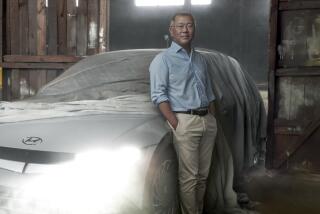Foreigners Get a Jump on Vietnamese Autos : Growth: Manufacturers, including U.S. companies, are exploring what looks like an attractive long-term market.
COLOA, Vietnam â The Mekong Corp., a Japanese-South Korean-Vietnamese joint venture, recently opened a truck and bus plant in Coloa village near Hanoi amid signs of increasing foreign interest in the Vietnamese market.
The Coloa plant, which will assemble Fiat Iveco light trucks and buses, is Mekongâs second, joining one assembling four-wheel-drive vehicle kits in Ho Chi Minh City.
Mekong is a joint venture among Saeilo Machinery Japan Inc., South Koreaâs Sae Young International and two Vietnamese state companies.
Vietnam has one other plant, which makes Mazda and Kia passenger cars and is run by Vietnam Motors Corp., a joint venture between Columbian Motors of the Philippines and a Vietnamese state firm.
All operate below capacity because the market is dominated by imported Japanese cars, new and used, executives said.
But foreign manufacturers--including U.S. companies sidelined by the U.S. economic embargo against Hanoi--want to explore what looks like an attractive long-term market.
French manufacturer Peugeot, which also produces Citroens, and South Koreaâs Daewoo have submitted assembly proposals to the government, industry sources said.
U.S. and other non-Japanese companies are concerned that Japanese car makers may have a stranglehold on Vietnam through their head start as the main importer. They also fear that the government will adopt a âmaster planâ for the industry drawn up by a Japanese corporation, Mitsubishi.
U.S. businessmen in Hanoi said Chrysler Corp., the most active lobbyist on behalf of U.S. companies, would be interested in production here if the embargo was lifted, and General Motors Corp. was also believed to have shown an interest.
âWe believe a U.S. manufacturing company should be playing an active role in southeast Asia,â said Kerry J. Ivan, Chryslerâs regional manager. âChrysler is taking active steps to play a role.â
Once American companies were relieved of the burden of the embargo, they would be in a better position to combat Japanâs lead, the U.S. businessmen said, and indications were that Vietnam would not necessarily keep the car industry as a Japanese preserve.
âThe feedback suggests that (the Vietnamese government) would like to see a balance--and rightly so,â one commented.
âI think Vietnam will let everyone have a bit of the action,â VMC Vice President Joaquin Roa said, adding that the Vietnamese were aware of the Japanese being âtoo big an economic power.â
Iveco, the commercial vehicle unit of Italyâs Fiat, moved in with technology transfer for Mekong as part of a general expansion in Asia, Fiat spokesman Richard Gadeselli said.
âItâs part of a strategy of looking at expanding markets outside Europe,â he said.
Iveco had expanded in Latin America and saw Asia as a good growth area.
Two years ago, it acquired Ashok-Leyland in India, which will provide the chassis for some of the vehicles to be built at Coloa. It also has a plant assembling knock-down kits in China and has bought the Australia Truck Corp., Gadeselli said.
âIn Vietnam, weâre mainly looking at the growing domestic market,â he said. âWith 71 million people, Vietnam is one of the key long-term markets of Asia.â
More to Read
Sign up for Essential California
The most important California stories and recommendations in your inbox every morning.
You may occasionally receive promotional content from the Los Angeles Times.










